“Fuck me,” Tony said. “You’re fucking gross.” He rolled away and pulled himself up by the sofa cushions. Nolan tried to stand up and got as far as his elbows, but Tony started kicking him, in the shoulder area. Not hard, but still, kicking. Nolan kept trying to get up but then he fell back again and hit his head on the floor; it kind of bounced. “What have you done with my kid?” Tony said. “Where is he?”
But Nolan was out cold, and I had to pull Tony off him.
“What were you doing up there?” he said. “Taking a nap?”
“I was trying to work out what to do.”
“Well, you didn’t do shit.”
He picked up the phone, which was lying on the floor, and started dialing. There were faint handprints on his shirt, one of those short-sleeved collared shirts you wear to go bowling, red with a black stripe down one side. It said Pearson’s Auto Parts in white italics, and then, underneath, Mayflower Lanes and Summer League 2006 . The color of the shirt hid most of the blood.
“Who are you calling?” I said.
“Who do you think, the cops.” But this took a while — he stood there giving answers. Yes, no, his name, his son’s name. What’s the address, he wanted to know, I don’t know the address. Everything pissed him off. He turned to me, waiting; everything distressed him.
“Tell them to send an ambulance.”
“Send an ambulance,” he said and hung up. “Where does he live?”
“He lives with his mom. The house on the corner.”
“Maybe she’s got Michael. What are you doing?”
“Waiting here till everybody comes.”
Tony took off. He had to step around Nolan, I heard him running down the stairs, and then I heard the front door bang. After a minute the door clicked open again and I heard him calling, “Marny, Marny!”
He was standing at the foot of the stairs, almost in tears. I went down and he said, “Which corner.”
So I showed him. I didn’t mean to go all the way, but he was walking fast and wouldn’t stop. It was about four o’clock, the real baking point of the day. School was out, and we didn’t see anybody. When I pointed out the house, he started running and then I ran after him and caught him on the steps and rang the bell.
Eventually Mrs. Smith waded into the hall. She opened the front door and looked at us through the screen. “I suppose you come to collect him.”
We both had to catch our breaths, but I said, “Is Michael here?”
“They’re in the garden, playing with the hose. Anything to cool down, it’s one of those days. I hope you don’t mind.”
“No, that’s fine,” Tony said.
“Would you like some lemonade? We’ve been making lemonade from scratch. It might be a little sour. They used a lot of lemons.”
“I just want to see my son.”
“He’s been fine, he’s been a good boy.”
Tony walked through the house and into the kitchen and out the back, which had a screen door, too, that clappered behind him. Mrs. Smith poured a glass of lemonade into one of those mottled translucent plastic cups, and gave it to me. We could see the garden through the back door. Clarence had the hose in his hand, and pointed it in the air, spraying the water upwards with his thumb. It fell down in a soft arch. Michael waited and then ran through the mist, squealing. Tony tried to pick him up but he wriggled out of his father’s arms. We couldn’t hear what Michael said but Tony put him down and Michael ran through the mist again.
“Those two just found each other, it’s a beautiful thing.”
“I wouldn’t mind a turn.”
“When I was a girl,” Mrs. Smith said, “when I was a teenager, my mother used to run a Bible study group on Wednesday afternoons, and all these old women, it was mostly old women, though I don’t suppose they were any older than me, came by the house and sat on my chairs and my sofa. Because I wasn’t permitted to disturb, my mother kicked me out. Being the youngest, most of the time they sort of gave up with me, I got the run of the house. But not on Wednesday afternoons. And all these old women talked about their grandkids. I got five grandkids, I got seven grandkids, I got three grandkids and another one coming. They were big on the numbers, it used to make me laugh. They talked about grandkids the way my brothers talked about home runs. But now I know. It’s hard work. You got to make them normal, not too much, you got to make them so they can love somebody, and you got to do it again and again and again. If I had five grandkids I’d count ’em, too.”
Eventually Tony picked up Michael and carried him in, and Clarence came after them, leaving the hose spilling into the grass. “Turn off that water!” Mrs. Smith called out and he went back and turned it off. He got his shoes wet in the spreading water, and Mrs. Smith said, “Take off those wet shoes,” when he came in.
“You sure I can’t get you a glass of lemonade?” she said to Tony. “You can put a little extra sugar in it.”
“We’re all right, we better get going. His mother is waiting for us.”
“Thank you,” I said. She held the door open behind us. Clarence stood beside her in wet socks. There were sock prints and Michael’s wet shoe prints all over the floor. The boys looked at each other but didn’t say anything; there were grown-ups around and they didn’t want to talk.
“Anytime,” Mrs. Smith said. “You can drop him off anytime.”
When we got down to street level, Tony took Michael’s hand and the kid kind of dragged himself along the sidewalk until Tony picked him up. “Are you okay? What happened?”
“Put me down,” Michael said. “I want to walk.”
“Well, hold on to my hand.”
“I don’t want to hold your hand.”
“Just tell me what happened and I’ll let you go.”
But Michael scrambled loose and ran ahead. Then he turned around to look at us and ran ahead again.
“I am unbelievably angry with you right now.”
“What did I do?” I said.
“I told you to keep Michael away from that boy. I told you something would happen.”
“I did keep him away, I don’t know what you mean.”
We walked on, it was only about a hundred yards to my house, and at one point Tony kind of laughed, and I said, what, and he said, “I bet that’s one angry bee.”
When we reached his car he opened the door and told Michael to get in. But Michael wouldn’t. “Get in the car!” Tony shouted suddenly.
“You can’t leave me like this,” I said. “What am I supposed to do with him?”
“There’s no way I take my kid in that house, with him like that. You got to be kidding me.”
“So leave him in the car.”
“There’s no way I leave him in the car.”
“Just lock the door. If something happens, he can honk the horn.”
“No way.”
“I don’t know what to do,” I said and sat down on the porch.
“Is Walter around?”
But Walter and Susie were out; we tried the bell.
“Just sit here and wait for the police. It will take me half an hour to drop off Michael and come back.”
“I’m hungry,” Michael said.
“Just get in the car.”
“I don’t know what to do,” I said. “It will take more than half an hour this time of day. Five o’clock traffic.”
But Tony drove off anyway and eventually I changed my mind and went inside. “Nolan, Nolan,” I called out, from the stairs. There wasn’t any answer. We had left the front door open, at least it was open when I reached the landing, and I walked in. Nolan lay on his side, with his legs swiveled over, so that both of his shoes and both of his shoulders touched the floor, but his hips stuck out. Lying like that he looked a little fat, like a strong middle-aged black man who had put on weight. The bandage from his face had stuck to his shirt. He was never very dark-skinned, and his skin had a washed-out whitish look, like when you put too much milk into a cup of tea. There was a crust of drying spit around his mouth.
Читать дальше












